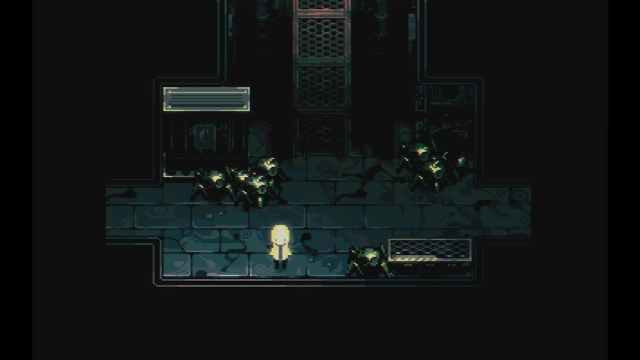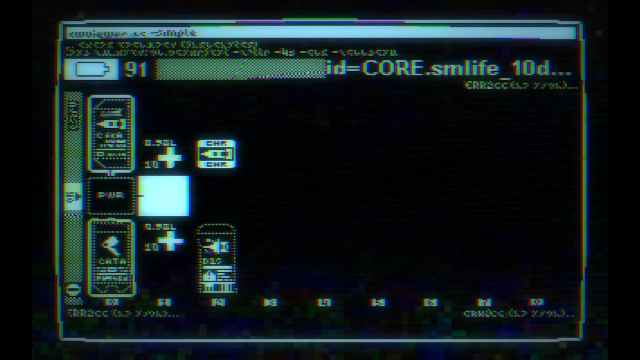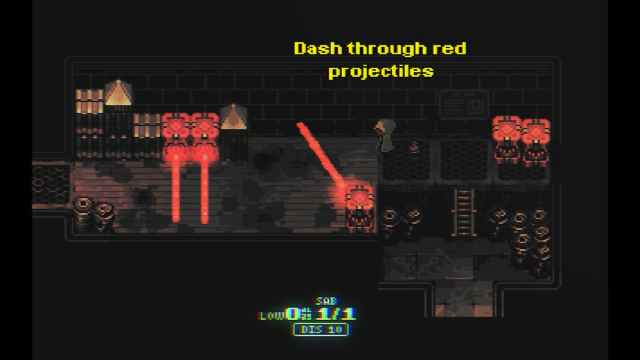It’s been a very long time coming
I’m not sure when Radio the Universe first caught my attention, but it didn’t look the way it looks now. The game’s Kickstarter page went live in 2012, and backer rewards were expected to ship in 2014; that obviously didn’t happen, and in the years since, I’ve gone back and forth on whether or not I expect the game to release at all. Developer 6E6E6E’s updates have been infrequent and vague, and the last update to the game’s itch.io page arrived nearly three years ago.
Part of me was very anxious when I heard that a Radio the Universe demo would be available during Steam Next Fest. I haven’t spent a decade actively imagining the game, but I have been thinking about it for quite some time, and it’s always tough for a game to live up to mounting expectations. The good news is, the demo for Radio the Universe is excellent.
Action, adventure, puzzles – the usual
Structurally, Radio the Universe isn’t breaking any new ground, at least not in this demo. It’s a top-down adventure game where you swing a big sword or shoot a gun at your enemies and, on occasion, at the environment. If you’ve ever played a 2D Zelda game, you know what to expect out of this one, give or take a dodge roll and a pistol. But crucially, the game iterates on all these ideas very intelligently.
Take, for example, the map. The map in the Radio the Universe demo is a pretty typical spoke-and-wheel affair, where new gear will sometimes open up new paths. The only real difference between this map and a million other top-down game maps is verticality, but that becomes a vital difference. The dodge button doubles as a jump button in regular navigation, which means that navigating single screens usually means finding a way over a wall, clearing paths, and creating new platforms to hop across. This doesn’t revolutionize top-down traversal, but it does feel just a bit more engaging than usual.
Oh, and really good combat
One other way Radio the Universe sets itself apart is in its progression system. Instead of traditional experience, Radio the Universe has cells, which you use to buy new skills and upgrades. Cells can be found all over the map in little boxes, but the most reliable way to get them is to loot them off of enemies. Enemies won’t drop cells if you simply kill them, though—you need to whittle their HP down to exactly zero.

That lends a uniquely tactical bent to combat. You can just wipe out enemies by tapping the attack button, but if you want to make meaningful progress, you need to carefully consider which attacks you’re using and when you’re using them. Your standard attack deals two damage per hit, but a charged attack will deal three, so some enemies will demand that you weave it into your move set if you want their precious cells. Radio the Universe builds that concept out in some really compelling ways. If the finishing blow is a dash-attack, for example, the enemy will always drop cells, so if you can run the numbers quickly enough, you can guarantee a clean finish in every encounter. One gun deals damage over time, so if you’re not feeling especially math-y, you can turn every fight into a war of attrition, where all your focus is on avoiding blows.
Making the right call at the right time is incredibly satisfying, and it makes progression feel very earned. When earning resources means going out of your way to tackle a more daunting challenge, everything feels a lot more worthwhile.
An alluring world
Honestly, I’m surprised by how much mechanical fun I’ve been having, given that I never really thought much about this game’s systems. Radio the Universe‘s real appeal, and the reason I’ve been tracking it for so long, is its aesthetic. The game takes place in a gloomy, mysterious, and endlessly alluring world. The actual visual design is wonderful. Towers with cobblestone floors are populated by whirring machines, the opulent constantly ceding ground to the dystopic. Computer terminals trapped somewhere between TRON and Cyberpunk 2020 are littered about looming cathedrals. It’s a real vibe.

That atmosphere is aided by a slow, moody, ambient soundtrack. It’s not the kind of music I’d want on a driving playlist, but it suits the game’s needs expertly. Radio the Universe also features a handful of presently inscrutable cutscenes with some gorgeous art. They remind me a bit of last year’s Signalis, a game I never fully “got,” but one that I really loved.
There’s undoubtedly a lot to unpack in all this ambience and design, thematically speaking, but the feeling that I’m overwhelmingly struck by is mystery. I don’t know what’s going on, and I’m glad that the game is willing to let me stew in that feeling. In fact, I wish the game was slightly more willing to leave me scratching my head. It’s by no means a hand-holding experience, but every so often, a tutorial message will pop up that feels just a little incongruous with this otherwise open, bizarre experience. I’m not against a bit of explanation, but it feels a bit patronizing to be told to dash through lasers.

A promising start
On the whole, that demo left me newly excited for Radio the Universe. I’ve been waiting for this game for a long time, and if the final product has the same satisfying combat and thoughtful world, then I imagine the wait will have been worth it. If you’ve had an eye on this one, or even if you’ve never heard of it, I highly recommend giving the demo a look.
Stay connected with us on social media platform for instant update click here to join our Twitter, & Facebook
We are now on Telegram. Click here to join our channel (@TechiUpdate) and stay updated with the latest Technology headlines.
For all the latest Gaming News Click Here
